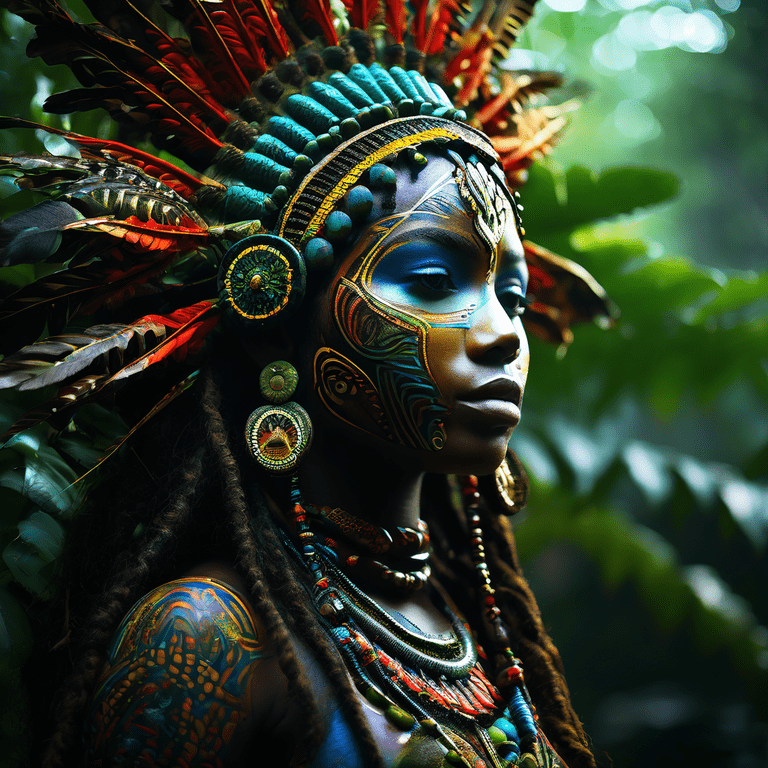Comparing Ibogaine and Ayahuasca: Differences and Similarities
Comparing Ibogaine and Ayahuasca: Differences and Similarities
Introduction
In the realm of alternative medicine and spiritual exploration, two substances have gained considerable attention: Ibogaine and Ayahuasca. Both are renowned for their profound effects on consciousness, offering pathways to healing, self-discovery, and spiritual growth. In this article, we delve into the differences and similarities between these two powerful substances.
History and Origin
Origins and Cultural Significance of Ibogaine
Ibogaine, derived from the root bark of the Tabernanthe iboga plant native to West Africa, has been used for centuries in the Bwiti spiritual tradition for rites of passage, healing ceremonies, and spiritual quests.
Origins and Cultural Significance of Ayahuasca
Ayahuasca, a brew made from the Banisteriopsis caapi vine and other plant additives, traces its origins to the indigenous tribes of the Amazon rainforest, where it has been used in shamanic rituals for thousands of years, revered as a sacred medicine for healing and spiritual communion.
Chemical Composition
Components of Ibogaine
Ibogaine primarily consists of the alkaloid ibogaine, along with other minor alkaloids found in the iboga plant, such as ibogamine and noribogaine.
Components of Ayahuasca
Ayahuasca is a complex brew containing harmine, harmaline, tetrahydroharmine (THH), and dimethyltryptamine (DMT), the latter being the primary psychoactive compound responsible for its visionary effects.
Effects on the Body
Physical Effects of Ibogaine
Ibogaine is known for its intense and prolonged psychoactive effects, often lasting up to 24 hours, during which users may experience tremors, nausea, vomiting, and changes in heart rate and blood pressure.
Physical Effects of Ayahuasca
Ayahuasca induces a purging response in users, often accompanied by vomiting and diarrhea, as the body detoxifies. It also affects motor coordination and can lead to changes in blood pressure and heart rate.
Psychological Effects
Psychological Effects of Ibogaine
Ibogaine is renowned for its introspective and visionary properties, inducing profound states of reflection, insight, and emotional processing, often leading to cathartic experiences and spiritual revelations.
Psychological Effects of Ayahuasca
Ayahuasca induces altered states of consciousness characterized by vivid visions, deep introspection, and emotional release, facilitating psychological healing, spiritual insights, and personal growth.
Therapeutic Uses
Medical Applications of Ibogaine
Ibogaine has shown promise in treating addiction, particularly to substances like opioids, by interrupting withdrawal symptoms and reducing cravings, although its use remains controversial due to safety concerns.
Therapeutic Uses of Ayahuasca
Ayahuasca is increasingly being explored for its therapeutic potential in treating various mental health conditions, including depression, anxiety, PTSD, and addiction, with ongoing research indicating promising results.
Safety and Risks
Safety Considerations for Ibogaine
Ibogaine treatment carries significant risks, including cardiac complications, neurotoxicity, and potentially fatal interactions with certain medications, necessitating thorough medical screening and supervision.
Safety Considerations for Ayahuasca
Ayahuasca ceremonies pose risks of adverse reactions, psychological distress, and interactions with medications, underscoring the importance of ceremonial guidance, medical screening, and a supportive environment.
Legality
Legal Status of Ibogaine
The legal status of Ibogaine varies worldwide, with some countries banning its use due to safety concerns, while others permit its use for research or as an unregulated alternative therapy.
Legal Status of Ayahuasca
Ayahuasca legality is similarly complex, with some countries prohibiting its use, while others allow for religious or ceremonial exemptions, and still others regulate its use within specific contexts.
Cultural and Spiritual Significance
Cultural Significance of Ibogaine
Ibogaine holds deep cultural significance within the Bwiti tradition, where it serves as a sacrament for spiritual initiation, healing rituals, and communing with ancestors.
Spiritual Significance of Ayahuasca
Ayahuasca is revered as a sacred sacrament in indigenous Amazonian cultures, where it is used for spiritual communion, divination, and connecting with the natural world and ancestral spirits.
Availability and Accessibility
Availability of Ibogaine
Ibogaine treatment is available in select clinics and retreat centers worldwide, although access may be limited due to legal restrictions, cost, and medical eligibility criteria.
Accessibility of Ayahuasca
Ayahuasca ceremonies are conducted in various countries where its use is legal or tolerated, primarily in South America, with increasing availability in urban centers around the world through organized retreats and shamanic practitioners.
Cost Comparison
Cost of Ibogaine Treatment
Ibogaine treatment can be expensive, often costing thousands of dollars for a single session, including medical supervision, accommodations, and post-treatment support.
Cost of Ayahuasca Ceremonies
Ayahuasca ceremonies vary in cost depending on location, facilitator experience, and amenities provided, with prices ranging from modest contributions to significant fees for immersive retreat experiences.
User Experience and Testimonials
Experiences with Ibogaine
Users of Ibogaine report diverse experiences, ranging from profound spiritual insights and emotional healing to challenging and confronting encounters with repressed trauma and unconscious material.
Testimonials from users of Ayahuasca often describe transformative experiences, including visions of profound beauty, encounters with spiritual entities, and deep insights into the nature of existence and consciousness.
Research and Studies
Scientific Research on Ibogaine
Despite its potential therapeutic benefits, research on Ibogaine remains limited due to legal restrictions and safety concerns, although ongoing studies continue to explore its efficacy in treating addiction and mental health disorders.
Studies on Ayahuasca
Ayahuasca research has expanded in recent years, with studies investigating its effects on brain function, psychological well-being, and treatment outcomes for various conditions, contributing to a growing body of evidence supporting its therapeutic use.
Conclusion
In conclusion, Ibogaine and Ayahuasca offer distinct yet overlapping pathways to healing, insight, and spiritual exploration. While Ibogaine is primarily known for its potential in addiction treatment and deep introspection, Ayahuasca is celebrated for its therapeutic versatility and profound visionary experiences. Both substances carry risks and require careful consideration, but for those seeking alternative approaches to healing and self-discovery, they represent powerful tools with the potential to catalyze profound transformation.
FAQs (Frequently Asked Questions)
- Is Ibogaine legal in the United States?
- Ibogaine is classified as a Schedule I controlled substance in the United States, making it illegal for most uses except for research purposes.
- Can Ayahuasca be dangerous?
- While Ayahuasca ceremonies are generally considered safe when conducted responsibly, they can pose risks, especially for individuals with certain medical conditions or when used without proper preparation or supervision.
- How long do the effects of Ibogaine and Ayahuasca last?
- The effects of Ibogaine can last up to 24 hours, while Ayahuasca experiences typically range from 4 to 8 hours, depending on dosage and individual sensitivity.
- Are there any medical contraindications for Ibogaine and Ayahuasca?
- Yes, both Ibogaine and Ayahuasca can interact with certain medications and medical conditions, requiring thorough medical screening and supervision.
- What should I expect during an Ayahuasca ceremony?
- Ayahuasca ceremonies typically involve drinking the brew in a ceremonial setting guided by an experienced shaman, with participants often experiencing purging, visions, and emotional catharsis.


